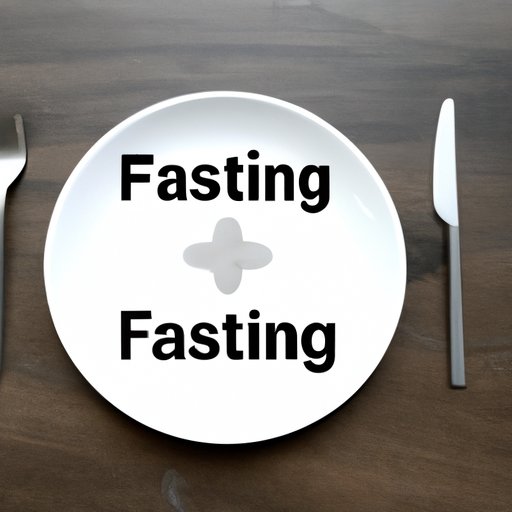
I. Introduction to Fasting
Fasting is not exactly a new concept. It has been used for centuries in various religious and cultural practices. Today, however, many people are turning to fasting not for spiritual reasons, but for its various health benefits – including weight loss. In this article, we’ll explore whether fasting is an effective weight loss strategy, the different types of fasting, and the pros and cons of fasting for weight loss.
II. Types of Fasting
There are two main types of fasting: intermittent fasting and extended fasting.
A. Intermittent Fasting
Intermittent fasting involves limiting your food intake to a specific window of time each day or week. The most common type of intermittent fasting is the 16/8 method, in which you fast for 16 hours and eat for 8 hours. Other intermittent fasting methods include alternate day fasting and the 5:2 diet, which involves eating normally for 5 days and restricting calories to 500-600 on two non-consecutive days of the week.
B. Extended Fasting
Extended fasting involves going without food for longer periods of time, such as 24 hours, 48 hours, or even several days at a time. Some people choose to fast for up to a week or more, but this is not recommended without medical supervision.
III. Pros of Fasting
A. Health Benefits of Fasting
While weight loss is often the primary reason people turn to fasting, there are a variety of other health benefits associated with this practice.
1. Weight Loss
Fasting has been shown to be an effective weight loss strategy, particularly in combination with exercise. It works by reducing your overall calorie intake, which creates a calorie deficit and leads to weight loss. Additionally, fasting can help reduce insulin levels and increase human growth hormone (HGH), which can aid in weight loss and muscle gain.
2. Improved Digestion
Fasting has been shown to improve digestion by giving your body a break from the constant processing of food. It can also improve gut health and reduce inflammation in the gut.
3. Other Health Benefits
Some other health benefits associated with fasting include improved blood sugar control, reduced risk of heart disease and cancer, improved brain function and mood, and increased longevity.
IV. Cons of Fasting
A. Potential Risks/Dangers
Fasting can be safe for most people who are otherwise healthy, but there are some potential risks and dangers to be aware of. These include dehydration, electrolyte imbalances, low blood sugar, and even death in extreme cases.
B. Drawbacks of Fasting
Some people may find fasting difficult or uncomfortable, particularly in the beginning. It can also be hard to maintain social commitments or stick to a fasting schedule while traveling or during special events.
V. Tips for Successful Fasting
A. Best Practices for Fasting
To make fasting easier and more successful, here are some best practices to follow:
- Stay hydrated by drinking plenty of water and other non-caloric beverages
- Eat nutrient-dense foods during non-fasting windows to avoid nutrient deficiencies
- Start with shorter fasting periods and gradually increase your fasting time
- Listen to your body and stop fasting if you feel unwell
- Consider using fasting apps or support groups for motivation and accountability
B. Recommended Products to Aid in Fasting
There are a variety of products available that can help support fasting, including pre-made bone broths, herbal teas, and electrolyte supplements.
VI. Fasting vs. Dieting
A. Comparison of Weight Loss Results
While both fasting and dieting can lead to weight loss, there is some evidence that fasting may be more effective in the short term. One study found that intermittent fasting led to greater weight loss and fat loss in obese adults compared to a traditional calorie-restricted diet.
B. Effects on the Body
Both fasting and dieting can have positive effects on the body, including improved insulin sensitivity and reduced inflammation. However, fasting may also increase ketone levels, which can provide additional health benefits.
VII. Expert Opinions
A. Views from Medical Professionals
Many medical professionals support the use of fasting for weight loss and overall health. However, it’s important to speak with a healthcare provider before starting a fasting regimen, particularly if you have any underlying health conditions. Additionally, some medical professionals caution against extended fasting and recommend seeking medical supervision if you plan to fast for more than 24 hours.
B. Opinions from Nutritionists
Nutritionists generally agree that fasting can be a safe and effective weight loss strategy, but it’s important to approach it in a healthy and sustainable way. This may involve incorporating nutrient-dense foods during non-fasting windows, focusing on adequate hydration, and working with a healthcare provider or nutritionist to ensure you are meeting your nutritional needs.
VIII. Conclusion
of Main Points
Fasting can be an effective weight loss strategy, as well as a way to improve overall health. There are two main types of fasting: intermittent fasting and extended fasting. While there are many health benefits associated with fasting, there are also some potential risks and drawbacks to be aware of. To be successful with fasting, it’s important to follow best practices and listen to your body.
B. Final Thoughts on Fasting for Weight Loss
While fasting is not for everyone, it can be a safe and effective weight loss tool when done properly. It’s important to approach fasting in a healthy and sustainable way, and to work with a healthcare provider or nutritionist if you have any health concerns or questions about how to incorporate fasting into your lifestyle.




